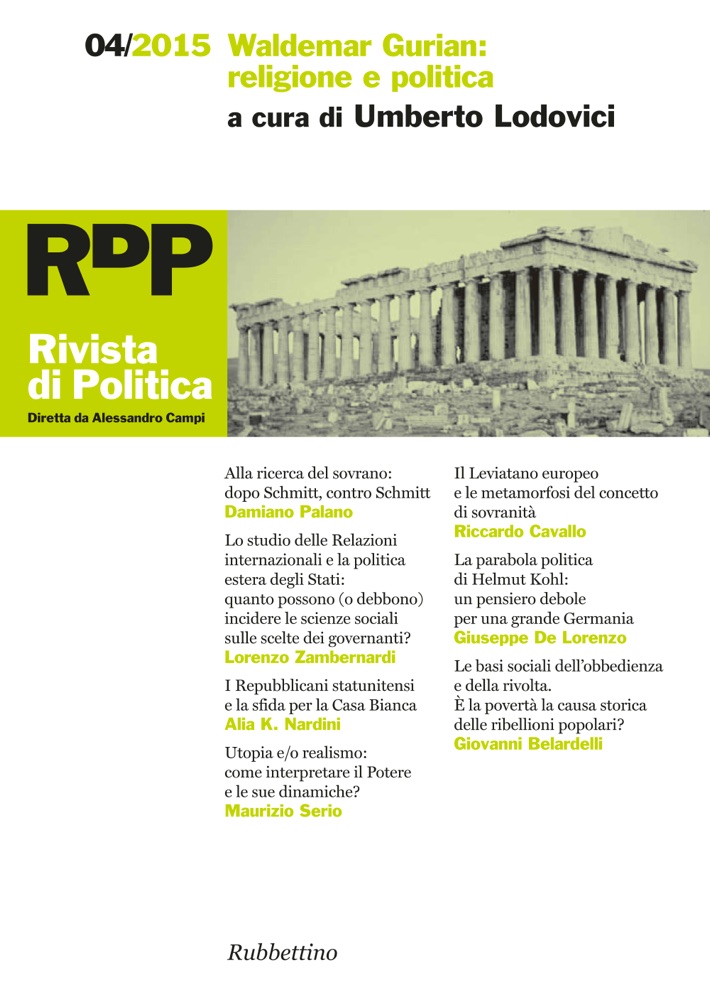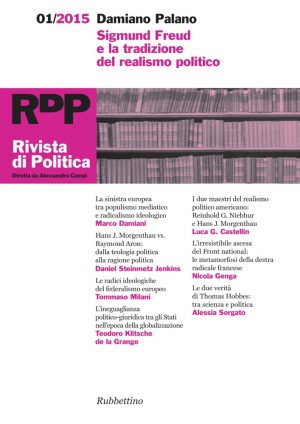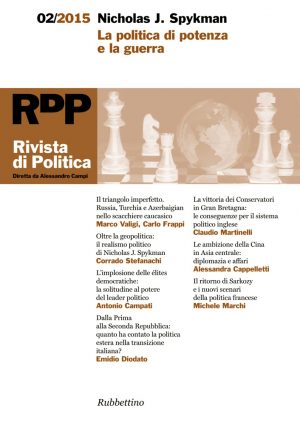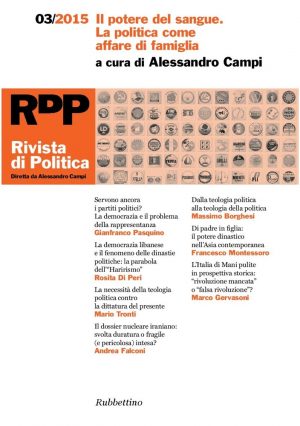04/2015 – Waldemar Gurian: religione e politica. A cura di Umberto Lodovici
ISSN: 2037-495X
12,50€ 11,00€
Descrizione
Sommario:
congetture e confutazioni
Cibo e politica: sulla relazione tra fame e movimenti di protesta Giovanni Belardelli
Il Partito Repubblicano statunitense: continuità storiche e prospettive future Alia K. Nardini
Politica e immigrazione: verso nuove forme di coesione e integrazione sociale Chiara Moroni
archivio del realismo politico: waldemar gurian
Waldemar Gurian: sui confini tra religione e politica Umberto Lodovici
Il pubblicista cattolico (1931) Waldemar Gurian
Tendenze della politica moderna (1940) Waldemar Gurian
Totalitarismo come religione politica (1953) Waldemar Gurian
dossier: potere politico, sovranità, stato
Introduzione. Alla ricerca del Sovrano
L’Europa all’ombra del Leviatano Riccardo Cavallo
La decisione e il soggetto. Tra normalità ed eccezione Alessio Musio
Il sovrano senza qualità. Note sul ‘politico’, la decisione, il soggetto Damiano Palano
teoria politica
Dalla teoria alla pratica? Sui limiti delle Relazioni internazionali come guida di politica estera Lorenzo Zambernardi
L’utopia politica come risorsa per il realismo Maurizio Serio
osservatorio internazionale
La politica della «passione calma»: il profilo di Helmut Kohl Giuseppe De Lorenzo
osservatorio italiano
L’evoluzione strutturale e i cambiamenti organizzativi dei partiti alla prova della legge n. 13 del 2014 Luca Mencacci
Additional Information
Abstracts
Umberto Lodovici, Waldemar Gurian: On the Borders between Politics and Religion
This introduction aims to outline Gurian’s essays and to place it within the categories provided by his intellectual journey. His life’s work was guided by a crucial question, that of the position of the church in modern society. Gurian was very determined to take a critical stand against the anti-democratic forces of his time – from the Action Française to totalitarian Bolshevism and National Socialism. Some elements of his attempt to clarify the complex structure of totalitarian regimes – total politicization of life, mass society, sacralisation of power – have played a pivotal role in the scientific discussion about totalitarianism. In his last essay, Gurian presents the church and the Christian religion as a fundamental adversary of such a politicisation of life.
Waldemar Gurian, The Catholic Publicist; Trends in Modern Politics; Totalitarianism and Political Religion
Catholic Publicist, Trends in Modern Politics, Totalitarianism and Political Religion are three of Gurian’s most representative essays. In the first one, Gurian analyses the role of the catholic publicist in the modern world. His task is to understand his own time in the light of reason and of the Christian tradition. In the second essay, totalitarian regimes and democracy are presented as competitors in the modern political life. The future will be decided on the basis of the belief in freedom and human rights. In the third one, totalitarian movements are described as secularized religions. The deification of the political system aims to satisfy all the wishes of its master and to mask actual imperfections with assurances of an eschatological perfection.
Riccardo Cavallo, Europe in the Shadow of the Leviathan
The starting point of this essay is Carl Schmitt’s insight that there must be an inextricable link between the fate of Europe and the concepts of state and sovereignty. When Schmitt traced the history of the modern state and of sovereignty, understood as suprema potestas superiorem non recognoscens, he unavoidably met with Jean Bodin and Thomas Hobbes, whose works Schmitt reinterpreted through a decisionist approach. In particular, the analysis of the many faces of the Leviathan, being the latter the emblem of Hobbes’s absolutist state, is crucial. Although many scholars have decreed the death of the Leviathan, its terrifying shadow might emerge, in the European ‘great space’ (Großraum), as a Sovereign without quality.
Alessio Musio, The Decision and the Subject: Between Normality and Exception
This work intends to shed light on the relationship that exists, in anthropological and moral terms, between decision and sovereignty. While it first focuses on connection that these terms bear with Carl Schmitt ‘s thought, it also considers two other authors. The novelist Robert Musil, who exposes in his writing an age in which the (daily) act of deciding seems to be problematic and even extreme, and the German theorist Hannah Arendt, who offers a hermeneutic key to sovereignty by emphasising on the human relational dimension. The essay, as a result, moves away from Schmitt’s proposition while retracing its movements.
Damiano Palano, The Sovereign without Quality: Notes on the ‘Political’, the Decision, and the Subject
This article focuses on Carl Schmitt’s theory of sovereignty. In particular, Schmitt’s famous definition of sovereignty (“Sovereign is he who decides on the state of exception”) is considered an attempt to respond to the (anthropological and political) ‘crisis of the subject’. As this artcielw ill argue, Schmitt does not fully develop the radical implications of his own conception of the ‘political’, in particular regarding the link between the ‘political’ and ‘human nature’. As Leo Strauss already emphasized long ago, Schmitt does not take the criticism of liberalism beyond the theoretical horizon of liberalism itself, and in particular he does not abandon individualism nor the utilitarianism of liberalism.
Lorenzo Zambernardi, From Theory to Practice? On the Limits of International Relations Theory as a Guide for Foreign Policy
Albeit fashionable in some academic circles, the idea that International Relations theory should influence practice is based on the problematic view that scholars allegedly have a privileged epistemological standpoint making them more qualified than laymen and decision-makers to understand how international politics works. This article tries to show why this assumption is mistaken and suggests that the so-called theory–practice gap should not be bridged. The fact that International Relations theory should not directly influence policy does not mean, however, that students of international politics are of no political use. Their work should be justified not in terms of the direct application of their findings, but rather by virtue of its indirect and unintended consequences on policymaking. Relying on a liberal view of political knowledge, the article claims that the role of International Relations scholars is not to suggest to policymakers what action to take, but rather to prevent foreign policy being formulated in the absence of rival theoretical conclusions.
Maurizio Serio, The Political Utopia as a Resource for the Realism
Utopia, as a form of political imagination and as social criticism, is a phenomenon analyzed in a very heterogeneous way by academics. The aim of this article is to place political utopia within a broader theory of power. I intend, here, to shape a political space of coexistence between utopia and realism
through the drawing of a matrix where the most important dimensions of politics are considered in their mutual relationships. In particular, with reference to the individual structure based on rationality and on emotionality, we can empirically observe how utopia and realism can work together along the coordinates of time and space, even observing concrete historical episodes in European history.
Giuseppe De Lorenzo, The Policy of “Slow Passion”: Helmut Kohl’s Profile
The political profile of Helmut Kohl, observed in his personal and leadership qualities, is characterized by the “calm passion” which defined his rise to power and the retention of the chancellorship for many years. This characteristic influenced the style of government, a political element that, analyzed in the management of the party and the coalition, allowed the chancellor of Germany to deal with German reunification and, especially, with European integration as a leading actor.
Luca Mencacci, The Structural Evolution and Organisational Changes of Political Parties after the Adoption of Law n.13/2014.
Money is an important fixture within a healthy democracy. In less than two years, the political parties will have to give up direct public funding. They will have to find new ways to meet their financial needs. The challenge they face is not simple – not least for the decline of political participation. The collapse of party membership and the loss of territorial structure demand a serious rethinking about their internal structure and their widespread organization. Political parties will struggle to adapt to changing circumstances and keep up with new developments. They need to seek new ways of organizing and functioning if they are to survive to the end direct public funding. This essay tries to examine and assess if the application of democratic principles according to art. 49 of the Italian constitution might be a winning strategy.






